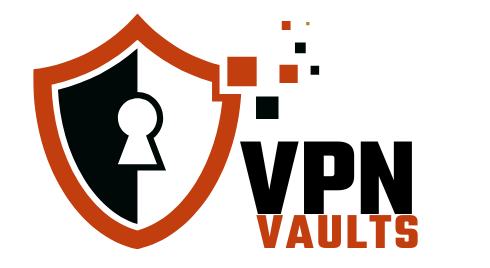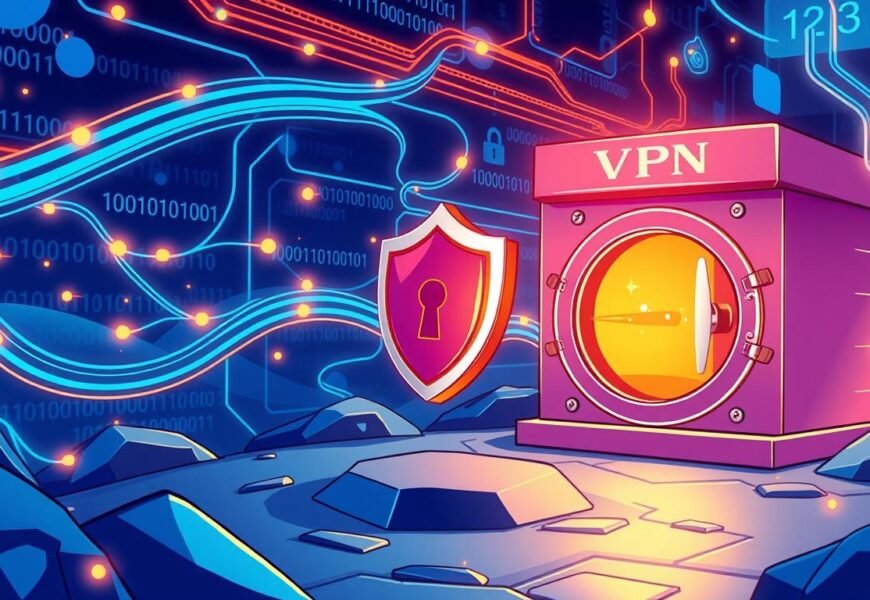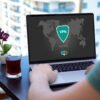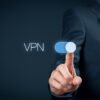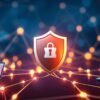Online banking is now a big part of our lives. But, it also brings risks like identity theft and financial fraud. So, how do you keep your online banking safe? The answer is a virtual private network (VPN).
A VPN encrypts your internet, keeping your data safe from hackers. It helps protect your online banking and financial info from cyber threats. But, do you really need a VPN for safe online banking? Or are there other ways to keep your digital finances secure?
Key Takeaways
- VPNs encrypt your internet connection, protecting your financial data from hackers and cybercriminals.
- Public Wi-Fi networks pose a significant risk to online banking, and a VPN is essential for secure access.
- Mobile banking apps also require VPN protection to prevent data breaches and identity theft.
- Free VPNs often lack the security features and encryption protocols of paid services, compromising your online safety.
- Using a VPN alone is not a guarantee of online safety; it should be combined with other security measures for maximum protection.
Understanding Online Banking Security Risks
The banking world has changed a lot with the rise of digital banking. Now, more than three-quarters of Americans (78%) choose online and mobile banking to manage their money. But, this shift has also brought new digital banking threats like malware, phishing, and Wi-Fi spying.
Common Threats to Digital Banking
Cybersecurity is a big worry for online banking. Hackers keep finding new ways to steal important info, like login details and account numbers. They use tricks like phishing and data breaches. The rising cases of financial cybercrime worry both banks and their customers a lot.
Why Traditional Security Measures Aren’t Enough
Old security methods, like simple passwords, can’t keep up with today’s hackers. Passwords can be guessed or stolen, leaving users open to attacks. It’s smart to change your online banking passwords every three to six months to stay safe.
The Rising Cases of Financial Cybercrime
Online banking’s growing popularity has made it a tempting target for hackers. They use public Wi-Fi to create fake networks and steal info. Banks watch for unusual IP addresses to catch these scams, but the danger is still there.
“Two-factor authentication can enhance security, making it difficult for hackers to access online or mobile banking accounts, adding a second layer of verification.”
What is a VPN and How Does It Work
In today’s digital world, keeping your online transactions safe is crucial, especially for banking. VPN technology is a key solution for this problem. It makes a private, encrypted path over public networks. This path hides your IP address and where you are.
A VPN works by making a secure tunnel between your device and a server far away. It encrypts all data going through it. This encryption, using 256-bit AES, keeps your banking info safe from hackers.
“A VPN is an essential tool for secure online banking, providing an additional layer of protection against identity theft and financial cybercrime.”
By hiding your real IP address and showing a VPN server’s, it keeps your location and activities secret. This is very helpful when using public Wi-Fi to check your bank accounts. Public Wi-Fi is a high-risk area for data theft.
In short, a VPN makes a secure tunnel for your internet use. It keeps your banking safe from hackers. Using a VPN makes your online banking safer and reduces the risk of identity theft or fraud.
VPN for Online Banking: Essential Features
For secure online banking, a good VPN is key. VPNs protect your financial and personal info from hackers. Let’s look at what makes a VPN great for online banking.
Encryption Protocols and Standards
The heart of a VPN’s security is its encryption. Choose VPNs with 256-bit AES encryption. This top-notch VPN encryption keeps your data safe from hackers.
Server Network Requirements
A strong server network is vital for banking from anywhere. Pick a VPN with many servers worldwide. This lets you connect fast and avoid slow speeds.
Speed and Reliability Factors
For online banking, connection speed and reliability matter a lot. Go for a VPN that’s fast and always connected. This prevents delays in your banking.
Features like a kill switch and leak protection keep your banking safe. They work even if the VPN connection drops.
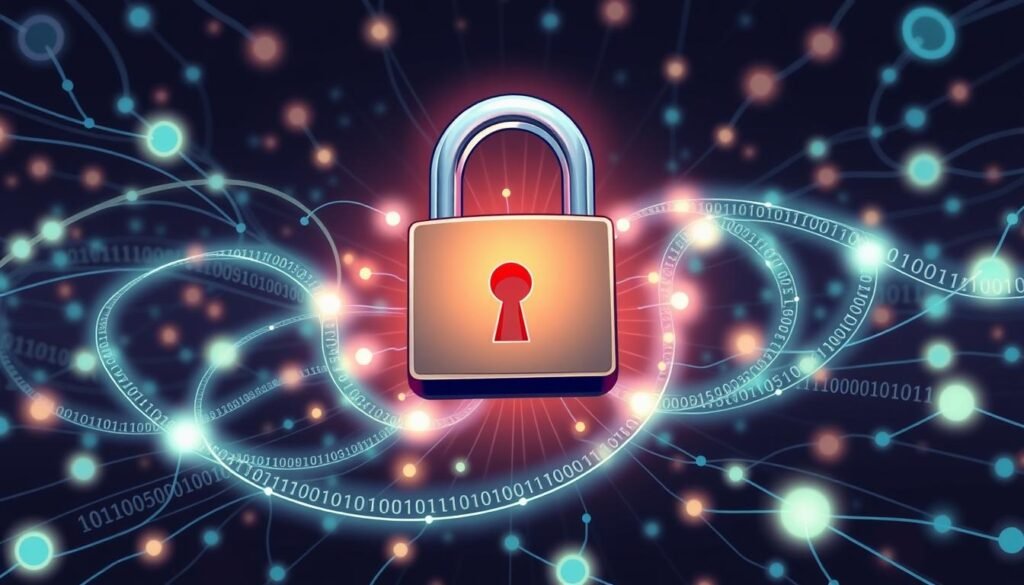
Also, a strict no-logs policy is essential. It means your banking data stays private and is never shared.
“A reliable VPN is the key to banking securely online, protecting your financial transactions and personal information from prying eyes.”
Best Practices for Secure Online Banking
Keeping your banking safe online is key today. Start by using strong, unique passwords for your accounts. Don’t keep your login details on devices without protection, as this can lead to theft and fraud.
Watch out for emails or texts that seem too good (or bad) to be true from your bank. Always check any odd activity with your bank to make sure it’s real. Think about having a special account just for online stuff. This adds an extra shield.
- Make sure your computer and antivirus are current to fight off new threats.
- Don’t do banking on public computers or Wi-Fi because hackers might see your info.
- Keep an eye on your account and turn on alerts for any transactions. This helps catch odd stuff fast.
By sticking to these secure banking habits, managing your passwords well, and keeping your devices safe, you can lower the chance of fraud and identity theft online.
“Cybercriminals are always getting smarter, so you must stay alert and act fast to protect your online banking.”
When to Use a VPN for Banking Activities
Keeping your financial transactions safe is very important today. A Virtual Private Network (VPN) is a great tool for protecting your online banking. It’s especially useful in situations where your banking activities might be at risk.
Public Wi-Fi Banking Security
Using public Wi-Fi to check your online banking can be risky. Public networks are often not secure, making it easy for hackers to get your personal and financial info. A VPN encrypts your internet traffic, keeping your activities safe from hackers.
Mobile Banking Protection
Mobile banking apps are very convenient but also bring new risks. If your device gets lost or stolen, or if you’re on public Wi-Fi, your banking info could be at risk. A VPN helps keep your mobile banking sessions safe, protecting your personal and financial info.
International Banking Access
Traveling abroad can make it hard to access your international banking services. Your bank might think transactions from foreign IP addresses are suspicious. Using a VPN server in your home country keeps your banking access smooth while traveling, without raising alarms.
While VPNs offer great protection for online banking, picking a reliable VPN provider is key. Also, using VPNs with other security steps like two-factor authentication and strong passwords makes your digital banking even safer.
Common VPN Banking Mistakes to Avoid
Using a VPN can greatly improve your online banking security. But, there are common mistakes that can weaken its protection. One big mistake is using free VPN services. These often have poor security, sell your data, and can expose your banking info to hackers.
Another mistake is changing your VPN location too often. It might seem like hiding your activity, but it can trigger bank security alerts. This can lead to account lockouts and extra hassle.
- Visiting untrusted websites, even with a VPN, can still expose your device to malware and other security threats.
- Neglecting other essential security measures, such as antivirus software and regular system updates, can leave your device vulnerable to attacks, even with a VPN in place.
- Using weak passwords or reusing passwords across multiple accounts remains a significant risk, even with VPN protection.
To avoid these VPN errors and banking security pitfalls, choose a reputable VPN provider. Look for strong encryption, a large server network, and a good privacy record. Also, keep your online banking safe with strong passwords, two-factor authentication, and regular account checks.
“Cybercriminals are increasingly targeting VPN services to gain access to sensitive banking information. Avoiding free VPNs and following security best practices is essential for protecting your hard-earned money.”
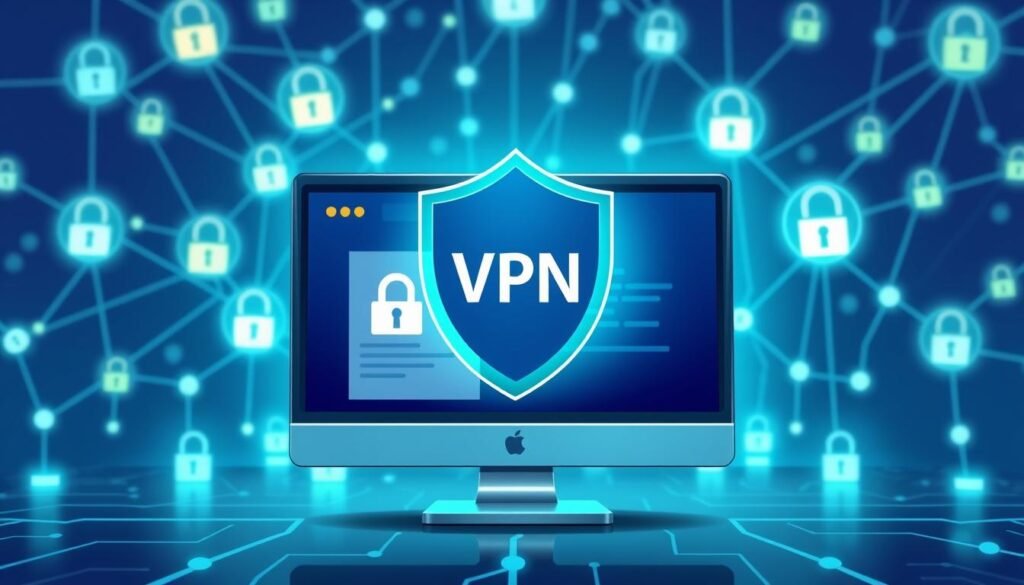
Additional Security Measures Beyond VPN
Using a virtual private network (VPN) is key to keeping your online banking safe. But, you need more than just a VPN to protect yourself fully. A multi-layered approach helps fight off identity theft and cybercrime.
Two-Factor Authentication Implementation
Turning on two-factor authentication (2FA) for your online banking is a smart move. It asks for a second check, like a code to your phone. This makes sure only you can get into your financial info, even if someone guesses your password.
Password Management Strategies
A password manager is great for making and keeping strong, unique passwords. It means you don’t have to remember lots of complex ones. Plus, updating your passwords often keeps your accounts safe.
Regular Security Updates
It’s important to keep your devices and software up to date. Hackers use old vulnerabilities to get into your stuff. So, updating your security patches often helps keep you safe.
Having a strong security plan that includes more than just a VPN is vital. It makes your online banking safer and shields you from cyber threats. By adding these steps, you can have a safer digital banking experience.
“Multifactor authentication (MFA) blocks 99.9 percent of all automated cyberattacks.”
– Microsoft research
Choosing the Right VPN Provider
Choosing the right VPN provider is key to keeping your online banking safe and protecting against identity theft. The VPN market has many options, but not all are the same. Look for a provider with a good reputation, strong privacy policies, and advanced security features.
Top VPNs like NordVPN, ExpressVPN, and Surfshark are known for their dedication to privacy and security. They offer top-notch encryption, a large server network, and a strict no-logs policy. This means your online activities stay private.
- Choose VPNs that use the latest encryption, like AES-256, to protect your data.
- Make sure the provider has many servers. This lets you connect to places that let you access banking services.
- Check the provider’s privacy policy. It should show they don’t log or store your online activities, keeping you anonymous.
Also, think about connection speed, reliability, and extra security features like kill switches and IP address leak protection. Reading user reviews and independent audits can give you a better idea of the provider’s performance and commitment to privacy.
“A reliable VPN provider should have a strong track record of service and prioritize user satisfaction.”
By carefully researching and comparing VPN providers, you can keep your online banking safe and secure from cyber threats.
Conclusion
Using a VPN for online banking makes it much safer. It encrypts data, hides your IP address, and protects you on public networks. VPNs are key for online banking safety, but they’re just part of a bigger security plan.
This plan should also include strong passwords, two-factor authentication, and keeping software up to date. With more financial cybersecurity threats, using a VPN is more important than ever for safe online banking.
Choosing a good VPN, like NordVPN or ZoogVPN, can really help. These services use top-notch encryption and have big server networks. They also have extra features to make online banking safer.
More people are choosing to bank online, with over three-quarters of Americans doing so. This makes using VPNs and other security tools even more important. With these steps, you can enjoy banking online while keeping your money safe from cybercrime.
